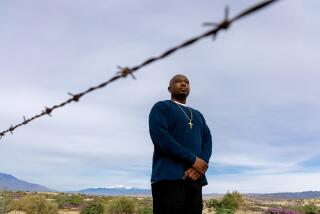Settlement Awarded to Harlins’ Siblings but Not Father
- Share via
The younger siblings of Latasha Harlins, the teen-ager who was fatally shot last year by grocer Soon Ja Du, will split a $300,000 court settlement from Du’s insurance company, but the children’s father will receive nothing, a judge ruled Tuesday.
The ruling closes another chapter in a case that heightened tensions among Korean-born merchants and their customers in South Los Angeles last year and which, many believe, contributed to the recent riots.
The decision by Superior Court Judge Gary Klausner resolves a dispute that arose after Vester Acoff Sr., the father of the dead teen-ager, returned to California from the Midwest to press his claim as inheritor of her estate--even though he had not seen his 15-year-old daughter in nine years.
The father filed a lawsuit to try to block one that was earlier filed by Latasha’s grandmother, Ruth Harlins, who had sued Du for damages on behalf of the teen-ager’s brother, Vester Acoff Jr. 11, and sister, Christina Acoff, 9.
On Tuesday, after Klausner’s ruling, the grandmother said she feels no sense of satisfaction from the resolution.
“The money is nothing,” she said. “If my granddaughter could come back they could have that money.”
In his ruling, Klausner concluded that Vester Acoff Sr., the father of all three children, had no right to the settlement money because Acoff could not prove he had financially supported Latasha or made any attempt to form a close relationship with her.
So little did Acoff care about the girl, Klausner wrote in his four-page ruling, that he left California seven years ago after the death of Latasha’s mother without saying goodby to his daughter, made no attempt to see her in the intervening years and did not attend her funeral, even though relatives sent him plane fare.
“As to the issue of care, the evidence submitted demonstrates a lack of care by the father for the child,” Klausner wrote in his order awarding the settlement money to Latasha’s brother and sister.
Latasha was shot once in the head by Du in March, 1991, as she walked away from a fight the two had in the store that began over a $1.79 container of orange juice the shopkeeper accused the teen-ager of trying to steal.
Police said the money for the juice was in the teen-ager’s hand when she died.
The incident immediately became a cause celebre in the black community, with activists pressing for a prison sentence for Du. The anger intensified when Superior Court Judge Joyce A. Karlin refused to allow a jury to consider a first-degree murder charge against Du, then sentenced the merchant to five years probation and 400 hours of community service when she was convicted of voluntary manslaughter.
The sentence was appealed by Dist. Atty. Ira Reiner, but was upheld.
The Harlins family and the Latasha Harlins Justice Committee failed to get Karlin censured by the state Commission on Judicial Performance and failed in an attempt to recall her. Karlin was reelected to a six-year term last month.
At a press conference Tuesday, Latasha’s aunt, Denise Harlins, said a new recall drive will be initiated in April.
In addition, Harlins said, members of the Latasha Harlins Justice Committee are in Washington this week pushing legislators to lobby the Justice Department to bring federal civil rights charges against Du.
Asked if she was satisfied with the $300,000 settlement, Denise Harlins said without hesitation: “I will never feel satisfied until I see Soon Ja Du in jail and Judge Karlin off the bench.”
More to Read
Sign up for Essential California
The most important California stories and recommendations in your inbox every morning.
You may occasionally receive promotional content from the Los Angeles Times.













